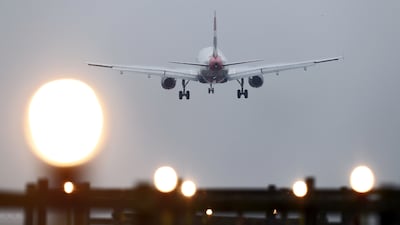Pressure on airline profitability has eased since the fourth quarter of 2021 and is set to continue to do so as passenger traffic recovers and cargo demand strengthens, said the International Air Transport Association.
An Iata survey of airline chief financial officers and cargo business bosses shows an improvement in profitability, demand, cargo and employment in an industry battered by the coronavirus-induced slowdown.
The survey was conducted between December 2021 and January 2022.
About 83 per cent of respondents reported growth in income or a reduction in losses compared with the same period a year ago — broadly unchanged from the October survey (85 per cent).
Those who experienced a deterioration cited rising jet fuel prices and Covid-19 outbreaks in key markets.
“Looking ahead, the survey suggests that the bottom-line figures will continue to improve, although the optimism is somewhat weaker compared with [the third quarter]," Iata said.
“Carriers mentioned concerns about Omicron's impact on travel demand, higher jet fuel prices and pressure in yields due to increased competition.”
In terms of passenger demand, 96 per cent of respondents reported an increase during the fourth quarter, compared with the same period in 2020. This is an improvement from 86 per cent in October and 81 per cent in July, as reported in past surveys.
The recovery was driven by the relaxation of cross-border restrictions in some key markets, including the reopening of transatlantic routes in early November.
More than nine in 10 survey participants (91 per cent) expect the recovery in passenger traffic to continue in the coming 12 months despite a surge in infections caused by the Omicron coronavirus strain.
“The further relaxation of travel restrictions and more efficient pandemic containment were cited as the key drivers behind the expected air travel rebound,” Iata said.
On the cargo side, the industry remains optimistic about demand in the year ahead, the survey showed.
About two thirds (64 per cent) of survey respondents predict that air cargo traffic will continue to improve while 29 per cent expect already strong cargo levels to remain unchanged.
In the fourth quarter of 2021, 71 per cent of respondents reported growth in volumes compared with the same quarter in 2020, while 21 per cent indicated that there was no change.
The improvement was due to higher demand for air cargo during peak season, partly thanks to congested supply chains in the shipping industry, Iata said.
Another growth factor was the recovering belly-hold capacity after the restart of passenger operations.
Air cargo has been a rare bright spot for the aviation industry since the onset of Covid-19 two years ago, with rates increasing due to a surge in e-commerce sales and as pandemic-related supply chain bottlenecks drive up demand for air freight services.
Airlines are also optimistic about employment in the 12 months ahead. More than half (59 per cent) of the survey's respondents expect payrolls to increase — an improvement on 47 per cent and 45 per cent cited in the October and July surveys, respectively.
“The staff hiring should be fuelled by the ramp up of passenger operations as travel demand improves,” Iata said.
This was the most optimistic employment outlook in two years, surpassing pre-crisis levels for the first time since the pandemic began, Iata said.
World's safest low-cost airlines - in pictures
The aviation industry has experienced a mass departure of skilled workers, who left their jobs permanently as airlines were forced to restructure and as government-imposed travel restrictions sparked uncertainty.
Aviation workers were laid off, furloughed or faced steep pay cuts as the industry grappled with the worst crisis in its history.
Last month, a separate survey by UK-based Goose Recruitment and industry publication FlightGlobal showed that more than a third of the world's airline pilots are still not flying while one in five remains unemployed as the pandemic continues to take a mental and financial toll on the profession.
In terms of costs, more than half of airlines in Iata's latest survey predicted an increase in input costs in the 12-month period — up 11 percentage points compared with October.
“Respondents were mostly concerned about further increases in jet fuel prices but also about inflation that threatens to [affect] a wide range of services and products,” Iata said.
Fuel accounts for about 25 per cent of an airline's total costs. Oil is continuing its march towards $100 a barrel, with crude prices at their highest since 2014 on tighter supply, higher demand and production constraints.
Airlines are more pessimistic about future passenger yields this year. Sixty-seven per cent of survey participants predicted that there would be no change or deterioration over the next 12 months, compared with 46 per cent in the October survey.
Respondents have attributed this to increased competition after the resumption of passenger operations, Iata said.






















